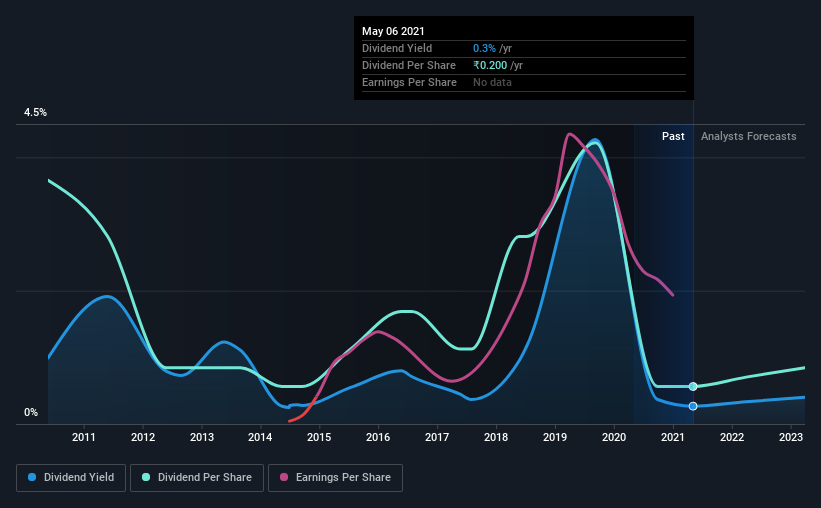- India
- /
- Construction
- /
- NSEI:NCC
How Does NCC Limited (NSE:NCC) Stand Up To These Simple Dividend Safety Checks?

Today we'll take a closer look at NCC Limited (NSE:NCC) from a dividend investor's perspective. Owning a strong business and reinvesting the dividends is widely seen as an attractive way of growing your wealth. If you are hoping to live on the income from dividends, it's important to be a lot more stringent with your investments than the average punter.
While NCC's 0.3% dividend yield is not the highest, we think its lengthy payment history is quite interesting. There are a few simple ways to reduce the risks of buying NCC for its dividend, and we'll go through these below.
Click the interactive chart for our full dividend analysis

Payout ratios
Dividends are usually paid out of company earnings. If a company is paying more than it earns, then the dividend might become unsustainable - hardly an ideal situation. As a result, we should always investigate whether a company can afford its dividend, measured as a percentage of a company's net income after tax. NCC paid out 5.4% of its profit as dividends, over the trailing twelve month period. Given the low payout ratio, it is hard to envision the dividend coming under threat, barring a catastrophe.
Another important check we do is to see if the free cash flow generated is sufficient to pay the dividend. NCC's cash payout ratio last year was 9.6%. Cash flows are typically lumpy, but this looks like an appropriately conservative payout. It's positive to see that NCC's dividend is covered by both profits and cash flow, since this is generally a sign that the dividend is sustainable, and a lower payout ratio usually suggests a greater margin of safety before the dividend gets cut.
Remember, you can always get a snapshot of NCC's latest financial position, by checking our visualisation of its financial health.
Dividend Volatility
Before buying a stock for its income, we want to see if the dividends have been stable in the past, and if the company has a track record of maintaining its dividend. For the purpose of this article, we only scrutinise the last decade of NCC's dividend payments. This dividend has been unstable, which we define as having been cut one or more times over this time. During the past 10-year period, the first annual payment was ₹1.3 in 2011, compared to ₹0.2 last year. This works out to a decline of approximately 85% over that time.
A shrinking dividend over a 10-year period is not ideal, and we'd be concerned about investing in a dividend stock that lacks a solid record of growing dividends per share.
Dividend Growth Potential
With a relatively unstable dividend, and a poor history of shrinking dividends, it's even more important to see if EPS are growing. NCC has grown its earnings per share at 9.3% per annum over the past five years. With a decent amount of growth and a low payout ratio, we think this bodes well for NCC's prospects of growing its dividend payments in the future.
We'd also point out that NCC issued a meaningful number of new shares in the past year. Regularly issuing new shares can be detrimental - it's hard to grow dividends per share when new shares are regularly being created.
Conclusion
To summarise, shareholders should always check that NCC's dividends are affordable, that its dividend payments are relatively stable, and that it has decent prospects for growing its earnings and dividend. It's great to see that NCC is paying out a low percentage of its earnings and cash flow. We were also glad to see it growing earnings, but it was concerning to see the dividend has been cut at least once in the past. All things considered, NCC looks like a strong prospect. At the right valuation, it could be something special.
Companies possessing a stable dividend policy will likely enjoy greater investor interest than those suffering from a more inconsistent approach. Meanwhile, despite the importance of dividend payments, they are not the only factors our readers should know when assessing a company. For example, we've picked out 2 warning signs for NCC that investors should know about before committing capital to this stock.
If you are a dividend investor, you might also want to look at our curated list of dividend stocks yielding above 3%.
When trading NCC or any other investment, use the platform considered by many to be the Professional's Gateway to the Worlds Market, Interactive Brokers. You get the lowest-cost* trading on stocks, options, futures, forex, bonds and funds worldwide from a single integrated account. Promoted
Valuation is complex, but we're here to simplify it.
Discover if NCC might be undervalued or overvalued with our detailed analysis, featuring fair value estimates, potential risks, dividends, insider trades, and its financial condition.
Access Free AnalysisThis article by Simply Wall St is general in nature. It does not constitute a recommendation to buy or sell any stock, and does not take account of your objectives, or your financial situation. We aim to bring you long-term focused analysis driven by fundamental data. Note that our analysis may not factor in the latest price-sensitive company announcements or qualitative material. Simply Wall St has no position in any stocks mentioned.
*Interactive Brokers Rated Lowest Cost Broker by StockBrokers.com Annual Online Review 2020
Have feedback on this article? Concerned about the content? Get in touch with us directly. Alternatively, email editorial-team (at) simplywallst.com.
About NSEI:NCC
Flawless balance sheet, good value and pays a dividend.


